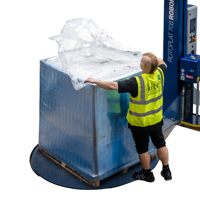The logistics industry is undergoing a transformative shift, driven by advancements in technology and automation. Among these innovations, intelligent pallet wrap machines are emerging as game-changers, redefining how goods are packaged, protected, and transported. With global supply chains becoming increasingly complex, the need for efficient, reliable, and cost-effective solutions has never been greater. Intelligent pallet wrap machines are addressing these demands, enhancing productivity while minimizing waste and ensuring product safety during transit.
The Rise of Intelligent Pallet Wrap Machines
Traditional pallet wrapping methods often involved manual labor or basic semi-automatic machines. While effective to an extent, these methods were prone to inconsistencies, human error, and inefficiencies. Intelligent pallet wrap machines, equipped with advanced sensors, programmable settings, and real-time monitoring capabilities, have revolutionized this process. These machines not only streamline operations but also optimize material usage and enhance load stability.
One of the key features of intelligent pallet wrap machines is their ability to automatically adjust tension, film layers, and wrap patterns based on the load’s size, weight, and fragility. This ensures optimal protection while reducing the risk of product damage. Moreover, many modern machines are integrated with IoT (Internet of Things) technology, enabling operators to monitor performance remotely, conduct predictive maintenance, and gather data for continuous improvement.
Benefits for the Logistics Sector
The adoption of intelligent pallet wrap machines brings several significant benefits to the logistics sector:
- Enhanced Efficiency: Automation reduces manual handling time, allowing for quicker wrapping and throughput. This increased efficiency not only accelerates logistics processes but also reduces labor costs, freeing up staff for more critical tasks.
- Cost Savings: Intelligent machines optimize film usage, minimizing waste and reducing costs over time. With programmable settings, businesses can fine-tune wrapping specifications, cutting down on excess material and significantly lowering expenses associated with packaging.
- Improved Load Stability: Consistent and precise wrapping enhances load stability, reducing the chances of damage during transportation. This is particularly crucial for fragile or irregularly shaped products, where even slight movement can lead to significant losses.
- Data-Driven Operations: IoT connectivity enables real-time monitoring and data collection, helping companies track performance metrics and identify areas for optimization. The ability to analyze wrapping efficiency, material consumption, and machine health in real-time allows for proactive decision-making.
- Reduced Environmental Impact: Optimized film usage not only cuts costs but also supports sustainability by reducing plastic waste. Intelligent pallet wrap machines are often compatible with eco-friendly films, further contributing to greener logistics operations.
Real-World Applications
Across various industries, intelligent pallet wrap machines are proving their worth. In the food and beverage sector, where hygiene and product safety are paramount, automated wrapping ensures contamination-free packaging. Similarly, in pharmaceuticals, consistent wrap tension preserves the integrity of delicate medical supplies.
Major logistics companies are also embracing this technology to streamline global supply chains. Automated wrapping allows for faster loading and unloading of goods, minimizing delays and improving overall delivery times. This efficiency is crucial in fast-paced sectors such as e-commerce, where consumer expectations for rapid shipping continue to grow.
Shaping the Future of Logistics
As global trade and e-commerce continue to expand, the demand for efficient and reliable packaging solutions will only grow. Intelligent pallet wrap machines are well-positioned to meet this demand by enhancing automation, reducing waste, and improving overall load security. Innovations such as smart sensors, AI-driven wrapping algorithms, and real-time analytics are setting new standards in logistics efficiency.
Looking forward, we can expect further advancements in this technology. The integration of artificial intelligence (AI) and machine learning (ML) could enable machines to adapt wrapping patterns autonomously based on predictive analysis of load types and transportation conditions. Furthermore, machine learning could predict maintenance needs before breakdowns occur, reducing downtime and extending machine lifespan.
Additionally, advancements in sustainable materials may further reduce the environmental impact of pallet wrapping. Biodegradable films and stretch wrap alternatives are already emerging, and intelligent machines are increasingly designed to accommodate these greener materials.
Conclusion
Intelligent pallet wrap machines are more than just an upgrade to traditional wrapping methods—they represent a fundamental shift in how logistics operations are managed. By boosting efficiency, cutting costs, and enhancing sustainability, these machines are playing a crucial role in shaping the future of global logistics. As technology continues to evolve, so too will the capabilities of pallet wrap solutions, driving the industry towards a more automated, data-driven, and sustainable future.
With increased adoption of rise of machines in technology, the logistics industry is not only optimizing its operations but also contributing to a more sustainable and resilient global supply chain. Intelligent pallet wrap machines stand at the forefront of this transformation, promising greater efficiency, enhanced protection, and a step forward in sustainable logistics practices.


